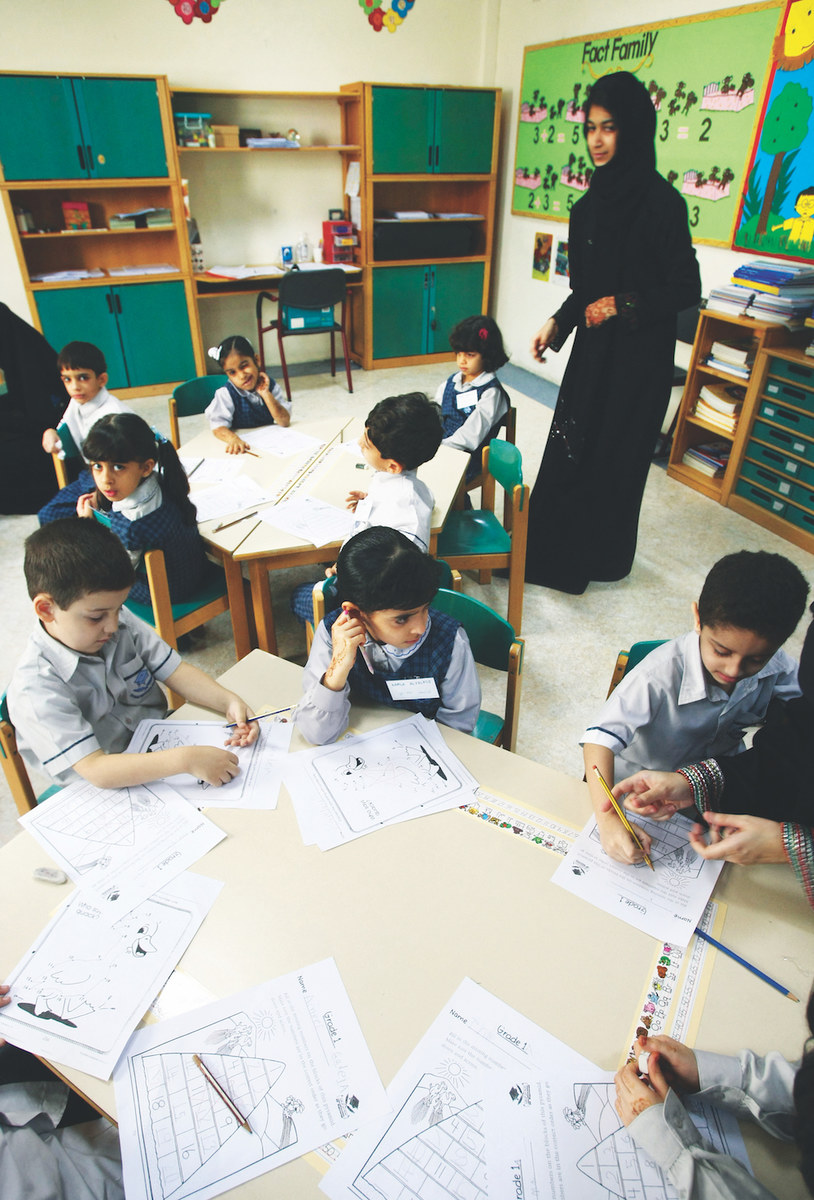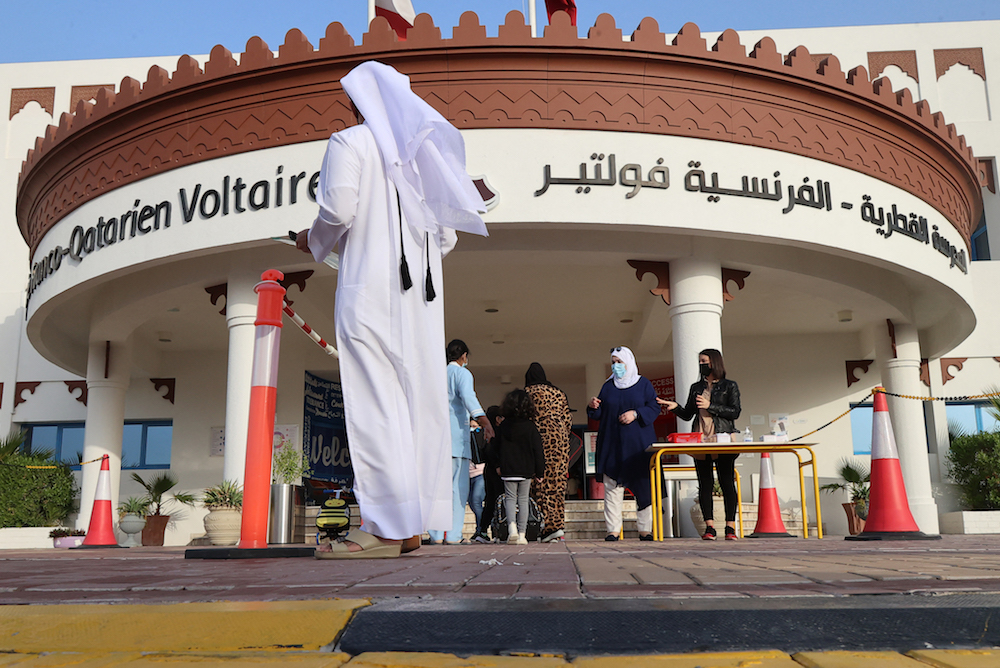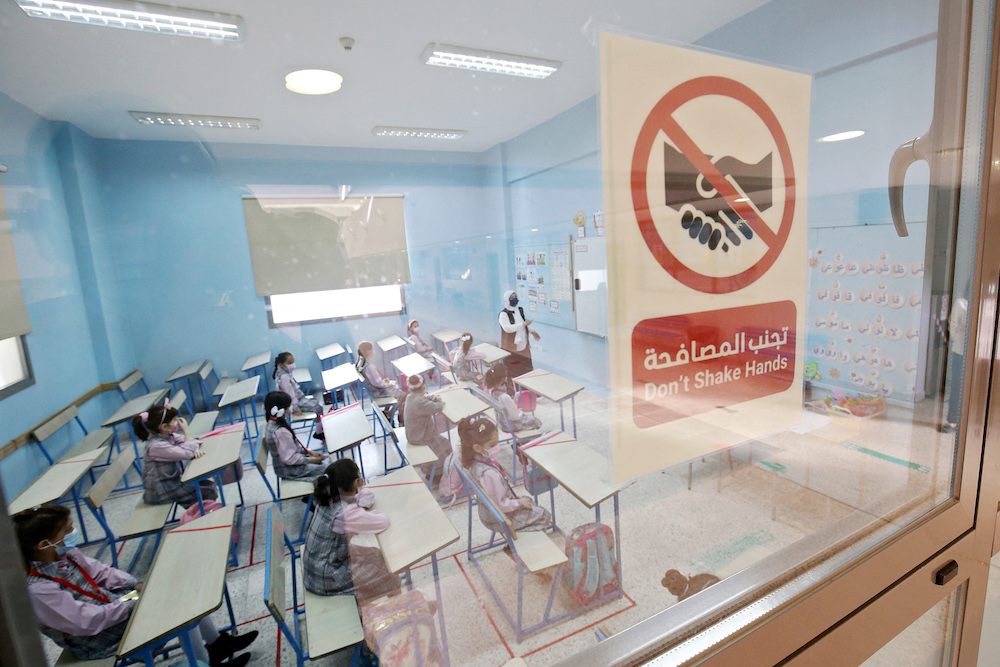DUBAI: Education, it is said, is an investment in the future. That is why the Gulf Arab states have invested heavily in high-quality schools, creating the infrastructure necessary for students to reach their full potential and build careers that are satisfying personally and beneficial to wider society.
However, the rapid proliferation of such schools has led to fierce competition for the best teachers, especially those with expertise in such important subjects as physics, chemistry and mathematics, amid a looming crisis at the international level.
About 69 million new teachers will be needed to provide quality universal education worldwide by 2030, according to figures from UNESCO. But with fewer teachers graduating, particularly in the UK, Ireland, and the US, the occupation faces an imminent shortage at the international level.
To attract and retain the right teaching talent, many Gulf schools offer generous compensation packages, which in turn have made admission fees more expensive. The worry for many experts is that low-income households will be steadily priced out of quality education.
According to Jo Vigneron, founding principal at the Pearson Online Academy, teacher shortage is a global phenomenon that is not reserved to the GCC region alone.

The GCC region is home to one of the youngest populations in the world, with early-years education vital for its development. (AFP/File Photo)
Over the past two decades, more has been expected of teachers in Western schools with little of this increased workload reflected in their salaries, she said, leading many to look for better-paid opportunities abroad.
“Young teachers in the UK frequently work second jobs as they struggle to pay their living costs, student loan and other expenses,” Vigneron told Arab News.
“As a result, an increasing number of British and US teachers have sought work overseas where the pay and conditions are more attractive. One would think, then, that there would be plenty of supply. In actual fact, there has been a simultaneous boom in the international market for British education.”
Natasha Ridge, executive director of the Sheikh Saud bin Saqr Al-Qasimi Foundation for Policy Research in Ras Al-Khaimah in the UAE, believes schools need to examine incentives other than pay to attract the best talent.
“Beyond increases in salary, which will obviously push up fees, schools could be offering more professional development opportunities for teachers, including attending conferences and online courses,” Ridge told Arab News.

Gulf schools are being urged to offer career incentives beyond good salaries to attract top talent as a global shortage looms. (AFP/File Photo)
“Promotion opportunities are also important so that teachers feel like their career is progressing and not stalled when they come overseas.”
Flexible leave during term time might also make roles more enticing, Ridge said, as would rewarding teachers who stay for five or 10 years with a period of leave so they can pursue professional development back in their home countries.
“Teachers are underpaid for the important job that they do and there need to be financial incentives for high-performing teachers so that they will come and stay,” she said.
“The issue in the Gulf is also that the majority of schools are run for profit, so investors try to make maximum money from minimum investment. This is a huge problem for the region.
“Teacher salaries are the single largest expense in a school’s operating budget, so this is where they try to save money, by hiring young teachers, letting older, more expensive teachers go, having basic health insurance, and not paying for professional development.”
Governments in the region might want to consider encouraging more schools to become non-profits with minimum salaries and class sizes. “But that is onerous and costly for governments, so they will have to weigh the costs and benefits,” Ridge said.
However, unless reform is implemented soon, there is a danger that a two-tier education system could emerge in which low-income families are deprived of access to quality schooling altogether.
FASTFACT
* A three-day education forum began in Riyadh on Sunday.
* International Education Conference 2022 is being attended by 262 institutions.
* Theme of the forum is “Education in Crisis: Possibilities and Challenges.”
In general, “what this means for society is an increasing wealth gap and then you see more social problems, crime, violence, health issues, unemployment, and even social unrest,” Ridge said.
“It is in the interest of every country to have a well-educated population for social cohesion and for economic growth.”
For Judith Finnemore, a UAE-based educational consultant and academic director at the Svarna Training Institute in Dubai, the issue is not merely about how to attract good teachers and boost retention but also how to raise overall standards of modern education.
“The quality the best teachers bring to education has to be considered,” Finnemore told Arab News. “In the next five years, the whole nature of skills required for the workforce in the MENA region will change.”
According to research from the World Economic Forum, how children in GCC countries are educated now will determine the livelihoods of more than 300 million people over the coming decades.

Arab students need teachers who see technology as a 'radical force,' experts have said. (AFP/File Photo)
Home to one of the youngest populations in the world, it is imperative for the region to make adequate investments in education that holds value in the labor market and prepares citizens for the world of tomorrow, the research states.
For Finnemore, very few teachers have the knowledge and skills that will be needed across all areas of business and industry — from data analytics, machine learning and statistics, to programming using Java and Python languages, computer networks, and parallel and distributed computing.
“This is a serious issue,” Finnemore said. “We don’t need teachers who have traditional mindsets. We need those who see technology as a force capable of radically transforming how they teach individuals and groups and the capacity it has for educating far and wide, not just in ‘their’ classroom.”
If the Gulf states want to be at the forefront of what the WEF has dubbed the Fourth Industrial Revolution, the region’s students will need a proper grounding in the relevant skills and subject areas of the future workforce.
“My own observations tell me there is a disconnect between those who teach in schools and the new requirements GCC economies need five or 10 years down the line,” Finnemore said. “So, in short, it needs not just any teacher. It needs a lot of the right teachers.”

About 69 million new teachers will be needed to provide quality universal education worldwide by 2030, according to figures from UNESCO. (AFP/File Photo)
Investment in professional development will prove essential to prepare teachers for the needs of the modern classroom.
“No teacher comes straight out of college possessing all the right skills,” Finnemore said. “They might have plenty of enthusiasm, but rarely the ability to get it all together to meet the highest levels of any teaching quality framework. This takes time and now their skills need constant updating. Don’t train and leave them festering too long, effectively making them deskilled.”
Offering teachers the incentive to retrain on short sabbaticals is one possible solution. “This would go on throughout their career and be financed through a guaranteed salary paid for jointly by the government and the school,” Finnemore said.
Other options include raising the teacher retirement age above 60 and emptying out training colleges and universities of professors so they can teach in schools.
Another potentially strong incentive would be the creation of a fair and equitable pay scale for teachers that is nationality agnostic and eliminates individual negotiation between schools and employees.

Jo Vigneron (left), founding principal of Pearson Online Academy says teacher shortages were a global trend. Judith Finnemore (right), director at the Svarna Training Institute in Dubai, says overall educations standards must rise. (Supplied)
“Western countries have salary scales, as does the government sector of most MENA countries,” Finnemore said. “If the MENA region wants good teachers, schools should pay teachers fairly and they will come.”
If schools in the Gulf region get the balance right, attracting the best-qualified teachers to educate the workforce of the future without putting poorer students at a disadvantage, the economic and societal dividends could be huge.
“The real asset of any advanced nation is its people, especially the educated ones,” Vigneron told Arab News. “The progress of countries and nations can only be measured by the level and extent of their education.
“A nation underpinned by integrity as well as talented and creative individuals is one that will thrive. It will include and embrace its people, retain its talent who will, in turn, grow the future talent, facilitating a culture in which all are able to contribute and thrive.”














